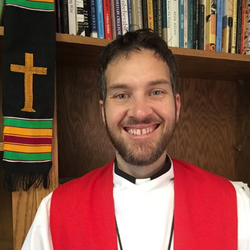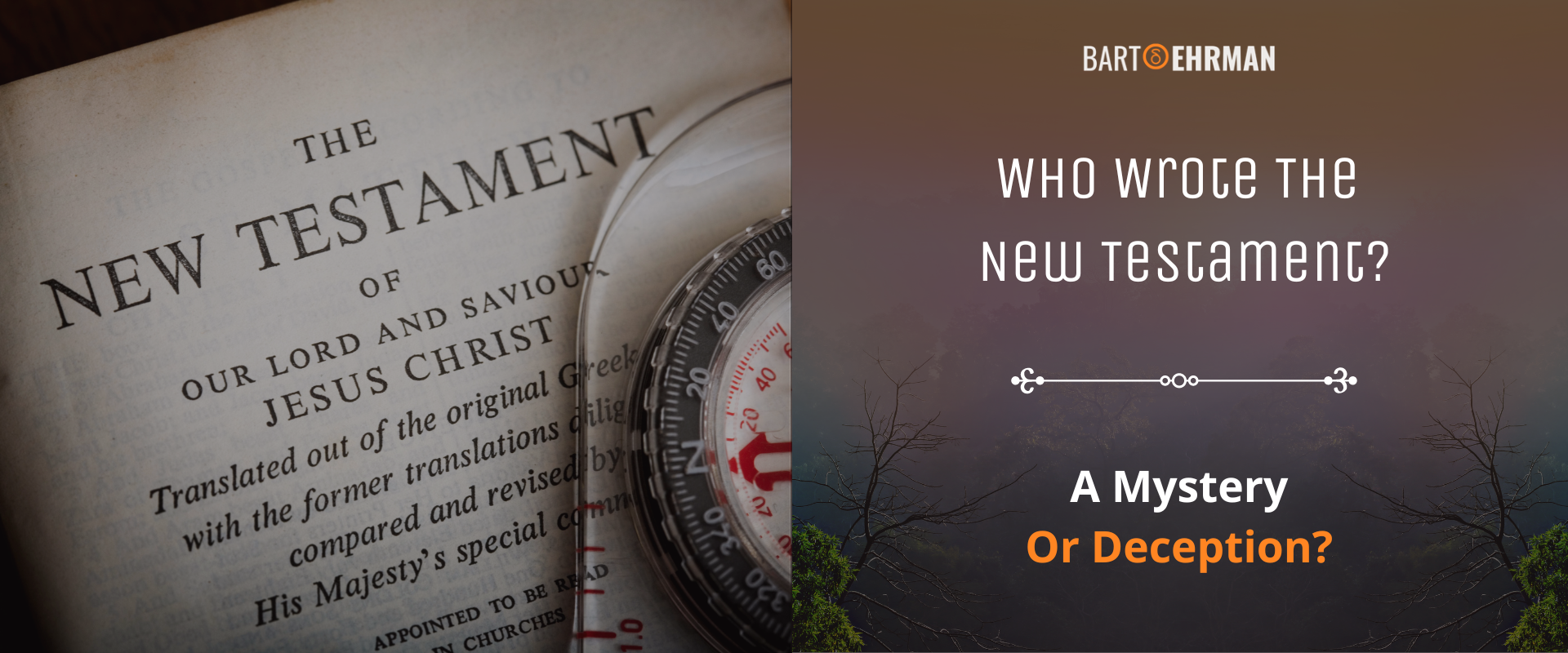Who Wrote the New Testament?

Written by Keith Long, MDiv
Author | Pastor | BE Contributor
Verified! See our editorial guidelines
Verified! See our guidelines
Date written: March 1st, 2023
Disclaimer: The views and opinions expressed in this article belong to the author and do not necessarily match my own. - Dr. Bart D. Ehrman
Who wrote the New Testament? Firstly, the New Testament is known as a collection of writings by Matthew, Mark, Luke, John, Paul, James, and Jude. But it’s not as simple as that. There is much debate among scholars about the authorship of some of these writings.
This means that traditional attributions are not universally accepted. Which makes for quite the mystery.
Bible stories are incredibly diverse – from the slightly esoteric Songs of Solomon to the militaristic conquests in Joshua and Judges, the Bible illuminates mystical encounters in Daniel and Revelation and character-driven epics in the Gospels of Matthew, Mark, Luke, and John.
While most theatrical performances are typically divided into three acts, the Bible is divided into two, referred to as “testaments.”
The Authorship of the Bible is Debated
The Old Testament is far older and more expansive in scope than the New Testament. But, unfortunately, no known original copies of either are available, only copies of copies going back thousands of years.
The authorship and authenticity of the Bible as a whole are the sources of in-depth debate. As a clergy member, nothing defines my role more than my grasp of the Bible’s content and ability to answer inquiries such as: How many authors wrote the Bible or put a little differently, who wrote the Bible, God or humans?
If you’re looking for a philosophical treatise on whether God is responsible for the words of the ancient scriptures, then keep surfing.
Instead, expect an overview of what I believe is behind the writing of The New Testament.

Who wrote most of the books in the New Testament?
When people use terms like “books” and “chapters” to describe the writings of The New Testament, one might wonder how this applies to writing today. I can tell you they are not like the books or chapters you and I are familiar with.
The most lengthy contribution to The New Testament is The Gospel of Luke, which comprises approximately 25,640 words. This is roughly less than a standard-sized one-hundred-page book in today’s literary world.
A better way to describe these twenty-seven contributions might be that The New Testament consists of over two dozen independent pamphlets and letters written on parchment.
These writings penned in ancient Greek contained no spaces between letters or words, no chapter or verse divisions – not even punctuation. Instead, they are a continuous flow of letters.
THE NEW TESTAMENT & PAUL
The manuscripts of the New Testament were typically produced through one of two methods: either the author wrote them by hand, or they employed a scribe to transcribe their ideas. The language used here is intentionally gender-specific, referring only to men. This is because it is widely believed that the New Testament was written exclusively by men, with most of it attributed to one man or others writing under his name.
The man I am talking about is Paul. A Greek-speaking Jew from Asia Minor, born in Tarsus in Cicilia (now modern-day Turkey.) He is often considered the most important person after Jesus in the history of Christianity and is credited with authoring thirteen letters of The New Testament, although the authorship of some of these is disputed:
- Romans
- 1st and 2nd Corinthians
- Galatians
- Ephesians
- Philippians
- Colossians
- 1st and 2nd Thessalonians
- 1st and 2nd Timothy
- Titus
- Philemon
The other fourteen:
- Matthew, Mark, Luke, John
- Acts
- Hebrews
- James
- 1st and 2nd Peter
- 1st, 2nd, and 3rd John
- Jude
- Revelation
…were written by a mysterious assortment of authors. Twenty-seven books make up the New Testament; as a whole, they are our earliest surviving Christian writings.
Who Wrote Matthew, Mark, Luke & John?
Opinions vary regarding the authorship of the four Gospels of Matthew, Mark, Luke, and John. Some assert that these were the actual names of the scribes. But most scholars conclude those names are merely placeholding pseudonyms, and the Gospels were written anonymously.
Dr. Bart Ehrman unveiled much more detail about this question of Gospel authorship in various books, podcast episodes, and online courses. You might also find other Bart Ehrman blog posts on this topic of interest.

The Remaining 10 Works Not Attributed to Paul
The remaining ten works of The New Testament that are not attributed to the apostle Paul’s direct input or influence are notoriously tricky to pin down in terms of authorship. The Book of Acts is commonly believed to have been written by the same writer as The Gospel of Luke, (70-95 CE). Let us not forget The Book of Revelation, also known as The Apocalypse of John (near the end of the first century), which is nearly as popular as The Gospels are in many Christian Bible studies.
The confusion over who wrote what in the New Testament is widespread. It’s no wonder the contributions are named for people and not places.
John & the Book Of Revelations
Most Christians believe Jesus’ disciple John wrote the Book of Revelation, and in dramatic fashion no less, from the Greek Island of Patmos as a persecuted outcast at the end of Domitian’s reign. Some believe that perhaps even the prophet Jeremiah from the Old Testament was responsible for these texts.
Historical studies, however, suggest a different setting. The author of Revelation was probably an early Christian prophet who knew several Christian traditions but was not directly acquainted with John’s gospels or epistles, writes Revelation scholar Dr. Craig Koester.
While likely not the same man who caught fish with his brother James and father, it is more plausible than the belief that the other pseudonym, “John,” was the actual name of the author of Revelation and that he was a Jewish Christian prophet active in Asia Minor at the turn of the first century.
Who Wrote the new testament: a Mystery or Deception?
As for the non-Pauline words of Hebrews, James, 1st and 2nd Peter, 1st, 2nd, and 3rd John and Jude, authorship is shrouded in uncertainty amidst these relatively obscure contributions.
This leaves their words in relative obscurity. You likely won’t see many Christians tattooing “3rd John 3:16” on their biceps (because it doesn’t exist) nor hear something from Jude quoted by politicians scrambling for Christian votes on the campaign trail. Although, that would be a welcomed change.
The ugly truth, however, is that from the Gospels to the so-called thirteen letters of the apostle Paul, most New Testament authorship is a mystery at best and deceitful at worst. Don’t take my word for it; take Bart’s–he wrote about it in his book Forged: Writing in the Name of God–Why the Bible’s Authors Are Not Who We Think They Are.
Were Non Pauline Letters Written by His Disciples?
There is a persistent Christian legend that some of the non-Pauline letters in the New Testament were written by Paul’s disciples rather than by Paul himself. This legend is propagated by some well-meaning Christians who want to give Paul’s teachings more authority.
The available evidence contradicts this notion. Essentially, determining the authors of the New Testament involves a lot of speculation. Evangelical Christians, in particular, are uneasy about non-apostolic authorship. They may believe that only Jesus’ closest associates and the prominent Christian missionary Paul could be responsible for “God’s Word” and the significant lessons on faith and life contained in these revered texts.
However, the reality is that the New Testament imparts valuable teachings on faith and life, and the impact of Jesus of Nazareth and the authorship of the texts play a relatively minor role in their overall influence.
Conclusion
The question of who wrote the New Testament can be summed up as “Paul of Tarsus and some other unknown authors.” Most authors’ true identities remain a mystery, as they did not leave any “About the Author” notes or other information that would aid historical research. I think it is hard to find fault with their missing signatures, as these men of mystery could not have been writing with modernity in mind.
Nonetheless, the New Testament preserves oral traditions about Jesus Christ and instructs the early Christian church. It contains messages intended for specific audiences during a specific historical period. Despite the obstacles faced during its creation and preservation, this ancient collection has remained relevant for over twenty centuries.
Its enduring influence is a remarkable achievement, given the many challenges it faced during the canonization process and beyond. It’s undeniable that the “New” Testament has remarkable staying power and mystique, considering we’re now more than two millennia past its publication.
FREE COURSE!
WHY I AM NOT A CHRISTIAN
Raw, honest, and enlightening. Bart's story of why he deconverted from the Christian faith.
Over 6,000 enrolled!

